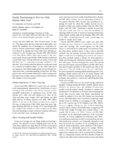TO
1 - 25 of 7
| Creator | Title | Description | Subject | Date | ||
|---|---|---|---|---|---|---|
| 1 |
 | Harpending, Henry C.; Rogers, Alan R. | Detecting positive selection from genome scans of linkage disequilibrium | Though a variety of linkage disequilibrium tests have recently been introduced to measure the signal of recent positive selection, the statistical properties of the various methods have not been directly compared. While most applications of these tests have suggested that positive selection has pl... | Genome scans; linkage disequilibrium; Gene trees | 2010 |
| 2 |
 | O'Rourke, Dennis H. | Introduction: origins and settlement of the indigenous populations of the Aleutian Archipelago | The series of papers in this special issue of Human Biology use an interdisciplinary approach to address regional questions and to integrate disparate Aleutian data into a broad, synthetic effort. The contributors leverage decades of data on Aleut origins, biogeography, and behavior through integrat... | 2010 | |
| 3 |
 | O'Rourke, Dennis H. | South from Alaska: a pilot aDNA study of genetic history on the Alaska Peninsula and the Eastern Aleutians | Abstract The Aleutian Islands were colonized, perhaps several times, from the Alaskan mainland. Earlier work documented transitions in the relative frequencies of mtDNA haplogroups over time, but little is known about potential source populations for prehistoric Aleut migrants. As part of a pilot i... | 2010 | |
| 4 |
 | O'Rourke, Dennis H. | Unangan past and present: the contrasts between observed and inferred histories | Abstract Academic research focusing on the population and culture history of the Aleut (Unangan) people began in the late 19th century and continues to the present. The papers in this special issue of Human Biology summarize the latest results from archaeological, linguistic, genetic, and morphometr... | 2010 | |
| 5 |
 | Wiessner, Pauline W. | Wealth transmission and inequality among hunter-gatherers | We report quantitative estimates of intergenerational transmission and population-wide inequality for wealth measures in a set of hunter-gatherer populations. Wealth is defined broadly as factors that contribute to individual or household well-being, ranging from embodied forms, such as weight and h... | 2010-02 | |
| 6 |
 | Hawkes, Kristen | Family provisioning is not the only reason men hunt | Gurven and Hill (2009) ask, "Why do mean hunt?" As they say, "The observation that mean hunt and women gather supported the simplistic view of marriage as a cooperative enterprise. Greater sophistication suggests that males may often be motivated by mating and status rather than offspring investment... | 2010-01-01 | |
| 7 |
 | Codding, Brian F. | Interpreting abundance indices: some zooarchaeological implications of Martu foraging | Indices of taxonomic abundance are commonly used by zooarchaeologists to examine resource inten sification, overexploitation and gender divisions in foraging labor. The original formulation of abundance indices developed a clear interpretive framework by linking the measure with foraging models from... | Human behavioral ecology; Zooarchaeology; Ethnoarchaeology; Resource intensification; Gender division of labor; Western Australia | 2010-07-20 |
1 - 25 of 7
